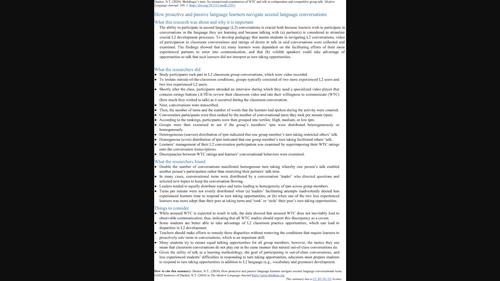当前位置:
X-MOL 学术
›
Mod. Lang. J.
›
论文详情
Our official English website, www.x-mol.net, welcomes your
feedback! (Note: you will need to create a separate account there.)
Schrödinger's turn: An interactional examination of willingness to communicate and talk in codependent and competitive group talk
The Modern Language Journal ( IF 4.7 ) Pub Date : 2024-02-20 , DOI: 10.1111/modl.12911 Nathan Thomas Ducker 1
The Modern Language Journal ( IF 4.7 ) Pub Date : 2024-02-20 , DOI: 10.1111/modl.12911 Nathan Thomas Ducker 1
Affiliation

|
Language learners are often required to negotiate classroom participation in pair and group work; therefore, willingness to communicate (WTC) could be a key determiner of second language (L2) success. Classroom WTC is volatile and influenced by interlocutor-related variables, such as reciprocal identities, group membership and atmosphere, and peer support; however, these antecedents are often studied from a psychological or ecological standpoint, in which learners’ cognitive and affective reactions to environmental factors are examined. These examinations rarely measure talk itself; however, it has been suggested that a key WTC factor is conversational behaviors. Talk and WTC arise in a communicative space negotiated between all interlocutors; therefore, this article positions conversational maneuvers, such as turn-taking and floor sharing, as key determiners of WTC. Idiodynamic data from 16 English-as-a-foreign-language (EFL) classroom conversations showed that (a) dependent on learner reactions, conversational floortime could manifest codependent and competitive facets, (b) EFL learners’ WTC and participation was highly dependent on experienced English users’ facilitating maneuvers, and (c) more voluble EFL students took better advantage of the affordances their experienced counterparts provided than taciturn students. Given the ultimate goal of out-of-class WTC and L2 contact, the findings have important implications for training EFL learners in communicative maneuvers to control conversational floortime.
中文翻译:

薛定谔的转变:对相互依赖和竞争性小组谈话中沟通和交谈意愿的互动检验
语言学习者经常需要在结对和小组作业中协商课堂参与;因此,沟通意愿 (WTC) 可能是第二语言 (L2) 成功的关键决定因素。课堂 WTC 是不稳定的,并受到对话者相关变量的影响,例如相互身份、小组成员和氛围以及同伴支持;然而,这些前因通常是从心理学或生态学的角度来研究的,其中考察了学习者对环境因素的认知和情感反应。这些检查很少衡量谈话本身;然而,有人认为 WTC 的一个关键因素是对话行为。Talk 和 WTC 出现在所有对话者协商的交流空间中;因此,本文将轮流和发言权等会话策略定位为 WTC 的关键决定因素。来自 16 个英语作为外语 (EFL) 课堂对话的自发数据表明,(a) 取决于学习者的反应,对话时间可以表现出相互依赖和竞争的方面,(b) EFL 学习者的 WTC 和参与高度依赖于学习者的反应。经验丰富的英语使用者的促进策略,以及(c)更健谈的英语学生比沉默寡言的学生更好地利用了经验丰富的同行提供的可供性。考虑到课外 WTC 和 L2 接触的最终目标,这些发现对于培训 EFL 学习者控制对话时间的沟通技巧具有重要意义。
更新日期:2024-02-20
中文翻译:

薛定谔的转变:对相互依赖和竞争性小组谈话中沟通和交谈意愿的互动检验
语言学习者经常需要在结对和小组作业中协商课堂参与;因此,沟通意愿 (WTC) 可能是第二语言 (L2) 成功的关键决定因素。课堂 WTC 是不稳定的,并受到对话者相关变量的影响,例如相互身份、小组成员和氛围以及同伴支持;然而,这些前因通常是从心理学或生态学的角度来研究的,其中考察了学习者对环境因素的认知和情感反应。这些检查很少衡量谈话本身;然而,有人认为 WTC 的一个关键因素是对话行为。Talk 和 WTC 出现在所有对话者协商的交流空间中;因此,本文将轮流和发言权等会话策略定位为 WTC 的关键决定因素。来自 16 个英语作为外语 (EFL) 课堂对话的自发数据表明,(a) 取决于学习者的反应,对话时间可以表现出相互依赖和竞争的方面,(b) EFL 学习者的 WTC 和参与高度依赖于学习者的反应。经验丰富的英语使用者的促进策略,以及(c)更健谈的英语学生比沉默寡言的学生更好地利用了经验丰富的同行提供的可供性。考虑到课外 WTC 和 L2 接触的最终目标,这些发现对于培训 EFL 学习者控制对话时间的沟通技巧具有重要意义。


















































 京公网安备 11010802027423号
京公网安备 11010802027423号